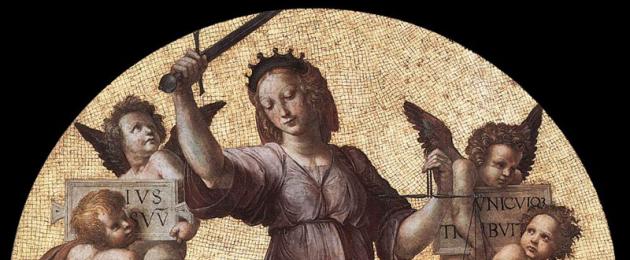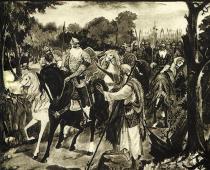gods of the first generation,
born from the marriage of the land of Gaia and the sky of Uranus
(six sisters and six brothers)
==============
# Hyperion
# Iapetus (Iapetus)
# Coy
# Crius
# Cron
# Ocean
# Mnemosyne
# Rhea
# Teiya (Feyya)
# Tethys
# Phoebe
# Themis
==============

Hyperion
husband of his sister Teia, father of Helios, Selena, Eos. Hyperion - "shining" god, lit. "going above", that is, across the sky and therefore is identified with Helios - often in Homer, in Hellenistic-Roman mythology - constantly; the sons of Helios are called hyperionides.
Iapetus
Husband of the Oceanid Clymene, who bore him Atlantis, Menetius, Prometheus and Epimetheus. According to other sources, they are the sons of Iapetus and the Oceanids of Asia. Iapetus is a member of the Titanomachy; was cast down by Zeus into tartar, sharing the fate of the brothers-titans.
Coy
brother and husband of the Titanides Phoebe, who gave birth to Leto and Asteria; grandfather of Apollo, Artemis and Hekate. Participated in the titanomachy and was thrown into tartar with his brothers.
Crius
· father of the titanides Pallas, Astrea and Persian, grandfather Nike, Strength, Power and Envy.

Kronos, Kronos
(K r o n o z) one of the titans, the son of Uranus and Gaia. At the instigation of his mother, he castrated Uranus with a sickle made of durable metal or even diamond in order to stop his endless fertility. After that, the titans became the supreme beings in space. The time when Cronus was "lord of the sky" was the golden age of mythological history. People in those days lived like gods, "with a calm and clear soul, not knowing grief, not knowing labors," according to Hesiod.
Having reigned instead of his father, Kron took his sister Rhea as his wife. However, according to the prediction of Gaia's mother, his own son was to deprive him of power, therefore, as soon as Rhea had children, Kron immediately swallowed them, wanting to avoid the fulfillment of the prediction. One day, Rhea deceived Kron by placing a stone wrapped in diapers instead of the youngest son of Zeus, which was swallowed by Kron.
Zeus was secretly nursed in a cave in Crete. Guarded by the Kurets, he grew up, became powerful and cunning. Having matured, on the advice of his wife Metis, he made Cronus drunk with a magical drink, thanks to which Cronus spewed into the world the brothers and sisters of Zeus - Poseidon, Hades, Hera, Demeter and Hestia. Under the leadership of Zeus, the children of Kron declared war on the titans, which lasted ten years. Terrible and stubborn was this struggle between the Kronids and Uranids. The Titans were powerful and formidable opponents. Zeus brought the Cyclopes out of Tartarus, who fettered him with thunderbolts and thunders, but they did not bring a quick victory either, no one's advantage was visible. Then Zeus brought the hundred-handed out of the bowels of the earth. They tore whole rocks from the mountains and threw them at the titans when they approached Olympus, where the Kronids settled.
This long-term battle, when everything in nature groaned, shuddered and burned with fire, was called titanomachy. This myth, apparently, reflected ideas about natural disasters that changed the landscape of the planet.
When the terrible hundred-armed ones intervened in the battle, the titans faltered, the domination of the insane and impersonal cosmic elements came to an end, the time came for intelligent human-like deities - the Olympians. The formidable power of the titans was broken. Zevs chained them all, including Kron, and threw them into the tartar, and appointed the hundred-handed watchmen. According to the Orphic tradition, Cron subsequently reconciles with Zeus and rules on the islands of the blessed, on the edge of the earth, beyond the Ocean, where only the dead live - hence the concept of the reign of Cron as a happy and fertile time arose.
Among the children of Kronus, his son from the nymph Filira, the wise centaur Chiron, also stands out.
Folk etymology brought the name Krona closer to the name of the time - Chronos. In Roman mythology, Kron is known by the name of Saturn, which was perceived as a symbol of inexorable time.
Cronus was dedicated to the festivities of kronii, in Rome - saturnalia, during which masters and servants changed their duties, and unbridled fun of the carnival type reigned.
Mnemosyne, Mnemosyne
the goddess of memory. She gave birth to the Muses from Zeus - nine daughters. According to the message of Pausanias, in Leybadei (Boeotia), near the cave of Trophonius, there were two sources: Leta - oblivion and Mnenosyne - memory. According to tradition, those who come to question the famous oracle first drink water from both sources in order to forget about worries and worries and remember what they heard and saw in the cave.

Ocean (Wk e a n o z)
You, begetter of immortal gods and mortal people,
You wash the circle of the earth, limiting it with yourself,
All seas and deep rivers come from you,
Moisture holy underground springs and streams - from you.
Orphic hymn
· the deity of the boundless and deep, the greatest and oldest river of the same name in the world, washing the whole earth (Homer "Iliad", XIV 245-246). In the far west, it marks the boundary between the world of life and the world of death. From this boundless river spring all other rivers and sea currents; from it the sun, moon and stars rise and fall into it.
The ocean is a titan of the first generation, the son of the sky of Uranus and the earth of Gaia, the brother and husband of the titan Tethys, with whom he gave birth to three thousand daughters - oceanids and the same number of sons - river streams. He is the father of Metis, the wise wife of Zeus. The ocean is also known for its peacefulness and kindness (tried unsuccessfully to reconcile Prometheus with Zeus).
According to myths, the Ocean did not participate in the battle of the titans against Zeus, because he was unable to raise his fluid body from the surface of the earth, but took the side of the gods of the new generation in this struggle, and therefore retained his power, as well as the trust of the Olympians.
The ocean and Tefis constantly live in their underwater palace, not participating in the affairs of the other gods.

Rhea (R e i a)
Mother of all immortal gods and mortal people, praise me,
Daughter of the great Zeus, O sonorous Muse!
She loves the sounds of rattles and tambourines and overflowing flutes,
The fiery-eyed roar of lions, the howls of wolves,
Ringing mountains and forested logs are deaf
Rejoice in the song and you, and with you all the other goddesses!
Homer
· Ancient goddess, Titanide, daughter of Uranus and Gaia, sister and wife of Kronos, who bore him Hestia, Demeter, Hera, Hades, Poseidon and Zeus. Kronos, fearing to be deprived of power, devoured his children, but Rhea, on the advice of her parents, saved Zeus. Instead of her son, she planted a swaddled stone for Kronos, which he swallowed, and secretly from her father sent her son to Crete, to Mount Dikta. According to one version of the myth, Rhea deceived Kronos at the birth of Poseidon. She hid her son among the grazing sheep, and gave Kronos the foal to swallow, citing the fact that she gave birth to him.
In the period of late antiquity, Rhea was identified with the Phrygian Great Mother of the gods and received the name Rhea-Cybele, whose cult was distinguished by an orgiastic character. Rhea's retinue in Crete consisted of the Curetes and Corybantes.
Theia, Feya
wife of Hyperion, mother of Helios, Selene and Eos.

Tethys,
Tethys, Tithea (T h q u z) · one of the most ancient deities, titanide, daughter of Uranus and Gaia, sister and wife of the Ocean, from marriage with whom she gave birth to three thousand oceanids and all the rivers of the world. The fertility of Tethys and her concern for countless offspring is indicated by the name of the goddess, associated with the Indo-European teta, "mother."
Tethys and the Ocean live at the end of the world, and there more than once, in order to reconcile the quarreling spouses, Hera went, whom they, at the request of her mother Rhea, sheltered during the struggle between Zeus and Cronus.
Phoebe
· sister and wife of Koya, sometimes associated with the moon along with Selena and Bendida. She is the mother of Leto and Asteria, the grandmother of Apollo and Artemis. Phoebe was considered the founder of the temple and oracle at Delphi, which she then presented to her grandson.

Themis,
Temida, Themis (Q e m i z)
· goddess of justice, daughter of Uranus and Gaia, titanide, second legal wife of Zeus, mother of or, goddesses of order in nature, and moira, goddesses of human destiny. According to one version, Themis is the mother of Prometheus, while she clearly approaches the earth Gaia and is thought of by one deity under different names. Possessing the gift of prophecy, the goddess reveals to Prometheus the secret that the marriage of Zeus to Thetis will lead to the birth of a son who will overthrow Zeus. From her mother Gaia, she received the Delphic oracle, which she passed on to her sister Phoebe, who gave this oracle to Apollo, her grandson.
In Olympia, near the altar of Gaia with her oracle and the altar of Zeus was the altar of Themis. As the goddess of Olympic mythology, Themis is no longer identified with the earth, but is her offspring, as well as the wife of Zeus as the basis of law and order. After she ceased to be the wife of Zeus, Themis became his adviser and mediator between Zeus and people. She conveyed to them the commands of the supreme god.
Themis is depicted with a blindfold, for she is a symbol of impartiality, with a cornucopia and scales in her hands. She represents justice and law. Judges and lawyers are called priests of Themis.

Justice
Alexander Terebenev, ser. 19th century

Justice and Pax in front of the throne of Venice
Paolo Veronese, 1575-77
Venice, Palazzo Ducale

Justice
Raphael Santi, 1509-11
Rome, Vatican Museums
- In contact with 0
- Google Plus 0
- OK 0
- Facebook 0








